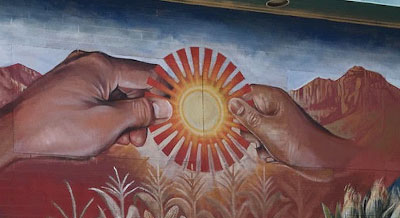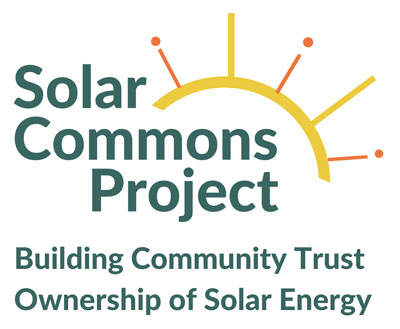
Overview
In the twentieth century private and public ownership structures created wealth for corporations, private companies and individuals and state treasuries. By the end of that century wealth disparity in the US had grown and common wealth in air, water, forests, and soil was dangerously depleted. Solar Commons trusts embed a market economy (market value of electricity) in the regenerative ecological principles of a gift economy (social wealth fund value) to create and share more equitable wealth for people and planet.
Trust Ownership for Equitable Wealth
If the US is to create equitable wealth that supports the flourishing of people and planet in the 21st century, it will need more diverse ownership structures that empower rural communities and urban neighborhoods to steward nature’s common wealth and keep economic benefits working for and in local communities. In short, the 21st century will have to embed market economies that over-reached in the 20th century into boundaries established by the natural world and by the equitable practices of local communities. These boundaries are created in Solar Commons community trust ownership by following principles of regenerative ecological and economic systems also known as “gift economies.”
There are three key principles used by Solar Commons trust ownership to create impactful gift economy-boundaries that support equitable wealth for people and planet in the 21st century.
- Trust ownership is a form of “stewardship”—trustees own legal title on behalf of their beneficiaries. Unlike state and private market actors who can own and govern their assets following inadequately structured regulations and globally free-market practices, Solar Commons trustees are bound to steward and govern their solar-generated monetary assets (funds) following rules created by local community members whose interests are focused at local scales. This reframing of ownership as stewardship provides the proper legal and cultural forms to capture common wealth (the sun shines for everyone) and use it to create more local common wealth following principles of equity established by local communities and by regenerative ecological principles. Solar Commons trustees follow the ethics of gift economies where reciprocity and obligation form boundaries that create right relationships in economic practices.
- Trust ownership offers locally responsive tools to equitably distribute the benefits of common wealth in local communities. A “trust agreement” is a creative legal process tool. Neighbors co-writing a trust agreement using general Solar Commons principles can be those who are most locally impacted by the distribution of the trust’s wealth. The Solar Commons Project is innovating trust law so that neighbors can build trust in each other as they participate in the rule-making that governs the common wealth of their Solar Commons trust fund.
- Trust ownership has two owners: the trustees (stewards of the common wealth) and the beneficiaries who are called “owners of the equitable title.” The term “equitable title” provides a creative legal moment where those most impacted by the distribution of common wealth become the co-owners of that wealth. The Solar Commons Project creatively shapes the term and ideas behind “equitable ownership” to empower low-income and BIPOC communities and to be publicly recognized agents claiming and governing their common wealth. SCP does this through co-created public art. The Tucson Solar Commons includes a large public-facing mural on the elementary school of the low-income beneficiaries neighborhood. The mural stands for the community’s “deed of equitable title.” The mural tells a story of how solar energy creates common wealth in a gift economy defined by intergenerational equity and reciprocal relationships of gifting and obligating between humans and nature.
The Solar Commons Project builds into the trust agreement annual celebration and play (SCP created a children’s board game on Nature Commoning and Solar Commoning so that children in the Tucson neighborhood can be messengers to their parents and friends of what equitable relations between between natural systems and human systems look like).
In the 21st century, equitable wealth must be redefined beyond state and market institutions. Communities who have been underserved by the wealth-creating institutions of the 20th century need better economic and cultural tools to claim and hold their share of common wealth. In order to bring transformational change to support more equitable distribution of wealth, the Solar Commons Project seeks to impact multiple levels of social experience: resource flow practices, relationship dynamics in ownership, and mental models that compel shared understanding through public art. These principles, tools, practices and cultural expressions shape boundaries and expectations that can compel local market economies to behave more equitably as they are judged and embedded in the experiences of earth-given and local community-given gift economies.


